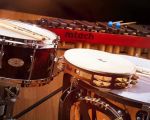Best Music Production Software for Electronic Music
As an electronic music producer, finding the best music production software is key to unleashing your creativity and producing tracks that stand out. Whether you’re just starting or you’re a seasoned producer, the right DAW (Digital Audio Workstation) can significantly impact your workflow and the final product. In this article, I’ll explore some of the best music production software options for electronic music, detailing their features, benefits, and what makes each one unique.
1. Ableton Live – The Industry Standard for Electronic Music Production
When it comes to producing electronic music, few DAWs are as beloved as Ableton Live. Its reputation as the go-to DAW for DJs, producers, and live performers speaks volumes. What sets Ableton apart is its intuitive interface, versatile features, and powerful tools that are perfectly suited for electronic music production. One of its standout features is the Session View, which allows for non-linear composition, making it easy to experiment with different loops and arrangements without interrupting the creative flow.
Additionally, Ableton Live excels in real-time editing, making it an ideal choice for producers who want to create and manipulate audio on the fly. Whether you’re working on a house track, techno, or ambient soundscapes, Ableton Live offers a robust library of plugins, virtual instruments, and effects that are tailored to the electronic music genre. It’s a must-have for anyone serious about electronic music production.
2. FL Studio – User-Friendly, Versatile, and Feature-Packed
FL Studio is another popular DAW among electronic music producers. Its user-friendly interface and feature-rich capabilities have earned it a spot as one of the best DAWs for beginners and professionals alike. Known for its powerful piano roll, FL Studio excels in beat making and melodic creation, making it particularly popular with producers of genres like hip-hop, EDM, and trap music.
The software also comes with an extensive array of built-in plugins and effects, including a wide selection of synthesizers, drum kits, and audio processing tools. FL Studio’s step sequencer makes creating loops and beats incredibly easy, while its ability to support VST plugins means you can expand your creative toolbox even further. Additionally, FL Studio’s lifetime free updates are a huge benefit for producers who want to stay up-to-date with the latest software advancements.
3. Logic Pro X – A Comprehensive DAW for Electronic Music Producers
If you’re using a Mac, Logic Pro X is a powerhouse DAW that’s hard to overlook. Known for its comprehensive set of tools, Logic Pro X is an excellent choice for producers who want to produce electronic music across a variety of subgenres. One of its most impressive features is its vast library of sounds, including virtual instruments, loops, and samples, which cover everything from classic synths to cutting-edge sound design elements.
Logic Pro X is particularly great for music producers who also want to create detailed arrangements and intricate compositions. The software supports advanced MIDI editing, automation, and offers high-quality effects and plugins. With features like the Drummer tool, which can generate realistic drum patterns, and the Flex Time function for time-stretching audio, Logic Pro X provides the flexibility needed for creating professional-level electronic music tracks.
4. Cubase – For Professional Producers Who Demand Precision
Cubase has been a staple in the music production world for decades, and it remains one of the best DAWs for electronic music production. Its precision and attention to detail make it a top choice for professional producers and sound engineers. Cubase excels in both MIDI and audio editing, with highly sophisticated automation, multi-track editing, and a wide array of high-quality effects plugins.
What sets Cubase apart is its support for advanced workflows, making it suitable for both intricate composition and large-scale production projects. It’s particularly favored by producers who focus on complex arrangements, such as progressive house, techno, and trance. Cubase also comes with an impressive selection of virtual instruments and samples, offering a variety of synths, drum machines, and orchestral sounds. If you’re looking for precision and reliability in your electronic music production, Cubase is worth considering.
5. Reason – The Virtual Rack of Tools for Sound Design Enthusiasts
Reason is a unique DAW that offers a modular, virtual rack of synthesizers, samplers, drum machines, and effects. If you’re someone who loves to tinker with sound design and create custom patches, Reason is perfect for you. Its unique rack-based interface lets you connect virtual instruments and effects in any way you like, giving you full creative control over your sound.
What makes Reason stand out is its ability to replicate hardware synthesis and offer a vast array of unique, professional-grade tools. Whether you’re into experimental electronic music or want to craft the next big club hit, Reason provides a creative space for designing everything from custom sounds to complex, evolving textures. It also supports VST plugins, so you’re never limited by the software’s native instruments.
6. Ableton Live vs. FL Studio: Which One Should You Choose?
If you're torn between Ableton Live and FL Studio, you’re not alone. Both DAWs have strong followings within the electronic music community, but they cater to different needs. Ableton Live is fantastic for live performances and real-time editing, making it a favorite for DJs and electronic performers. It’s also better for producers who prefer an intuitive, workflow-centric approach to music creation.
On the other hand, FL Studio is beloved for its ease of use and powerful piano roll, making it an excellent choice for beatmakers and melodic producers. If you’re someone who values speed and a straightforward user interface, FL Studio might be the right pick. It’s particularly great for those who are new to electronic music production but still want to create high-quality tracks.
7. Conclusion: Choosing the Right DAW for Your Electronic Music Production
Choosing the best music production software for electronic music depends on your specific needs and workflow. Each DAW offers unique features that can cater to different aspects of electronic music production, from beatmaking to sound design and composition. Ableton Live, FL Studio, Logic Pro X, Cubase, and Reason each have their strengths, so consider what works best for your style and production process.
Whether you're just starting out or are looking to upgrade your current DAW, the right software can open up new creative possibilities and take your music production to the next level. Explore the features, try out demos, and choose the one that best fits your needs. Ready to create your next big track? Click here to explore the best music production tools for electronic music.
OLD Keywords-66: SEO Title: Best Music Production Software for Electronic Music SEO Keywords: best music production software, electronic music production, DAWs for electronic music, Ableton Live, FL Studio, Logic Pro X SEO Description: Discover the best music production software for electronic music. From Ableton Live to FL Studio, find the perfect DAW to elevate your electronic music production.







